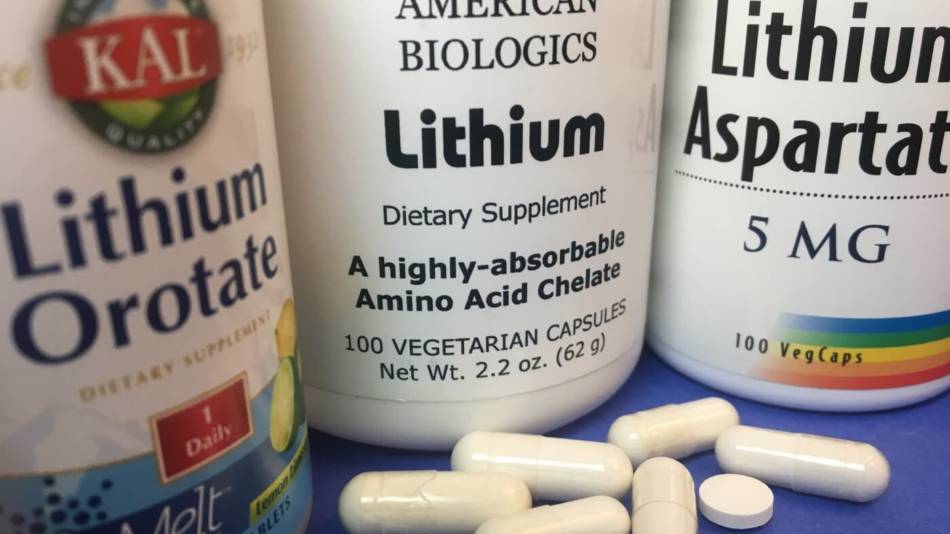Summary
-
What is lithium?
Lithium is a mineral used in large doses (hundreds of milligrams) as prescription medicine to treat bipolar disease but at much lower doses (fractions of a milligram to a few milligrams) as a dietary supplement. The form in supplements is typically lithium orotate or lithium aspartate, while prescription medicine is lithium carbonate or lithium citrate (see What It Is). Although all forms will provide lithium, read labels carefully to understand how much lithium is being promised because lithium is only a small portion of lithium-containing compounds, e.g., only about 4% of lithium orotate is elemental lithium (see Forms of Lithium). Use the Results table to easily compare amounts of lithium in tested supplements.
-
What do lithium supplements do?
There is no conclusive evidence that supplemental lithium helps. However, some observational studies and small clinical studies suggest that low-dose lithium may improve mood, reduce the risk of suicide and reduce the risk and/or progression of dementia (see What It Does).
-
How much lithium should I take?
Suggested daily doses of supplemental lithium range from about 0.3 mg to 5 mg — similar to, or slightly above, the amounts of lithium obtained per day from what we normally eat and drink (see Dosage).

Best choice for lithium supplements?
Many products passed our tests for quality, in which products were tested for their amounts of lithium and potential contaminants (lead, cadmium, and arsenic) (see What CL Found). Three supplements were selected as Top Picks. Be aware that many supplements on the market provide more lithium than you want, but it is possible to use partial dosing (see Dosage). -
Safety and side effects of lithium:
Too much lithium can cause toxicity and affect thyroid function (see Concerns and Cautions).
Products Tested in 2017
+— 23 sources
In addition the results of its expert testing, ConsumerLab uses only high-quality, evidence based, information sources. These sources include peer-reviewed studies and information from agencies such as the FDA and USDA, and the National Academy of Medicine. On evolving topics, studies from pre-print journals may be sourced. All of our content is reviewed by medical doctors and doctoral-level experts in pharmacology, toxicology, and chemistry. We continually update and medically review our information to keep our content trustworthy, accurate, and reliable. The following sources are referenced in this article:
- Lithiuim Prescribing Information 2018
- Sugawara, Int J Environ Res Pub Health 2013
- Schrauzer, Biol Trace Elem Res 1990
- Schrauzer, J Am Coll Nutr 2002
- Parker, JAMA Psychiatry 2018
- Greenblatt, Townsend Letter 2015
- Schrauzer, Biol Trace Elem Res 1994
- Nunes, Curr Alzheimer Res 2013
- Hampel, J Clin Psychiatry 2009
- Leyhe, J Alzheimers Dis 2009
- Forlenza, Br J Psych 2011
- Kessing, JAMA Psychiatry 2017
- Guttuso Jr., JAMA Netw Open 2024
- Bilikiewicz, J Alz Dis 2004
- Kling, J Pharm Pharmacol 1978
- Smith, J Pharm Pharmacol 1979
- Guelen, Biopharm Drug Dispos 1992
- Hanlon, JAMA 1949
- Johnson, The History of Lithium Therapy 1984
- Pauze, J Med Toxicol 2007
- Gitlin, Int J Bipolar 2016
- Broberg, Environ Health Perspect 2011
- Aprahamian, J Clin Psych 2014
As a ConsumerLab.com member, you may print a copy of this report for your personal use.
You can access a special print version by clicking the "Print" icon in the upper right corner of this report.
You can then use your web browser's print functions to print the whole report or just selected pages.
You may also email or post a link to this report using the web address above.
Non-members using the link will see a free summary and can join to view the full report.
Other means of copying or distributing this report, in part or full, are not permitted.
If you are sight-impaired and your computer is having trouble converting the text in this report to speech,
contact us for assistance at Membership@ConsumerLab.com or by
phone at 914-722-9149.


















